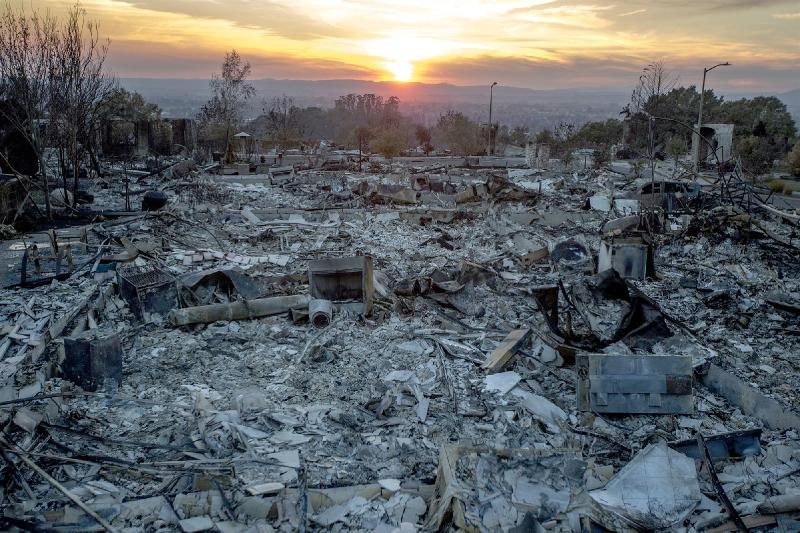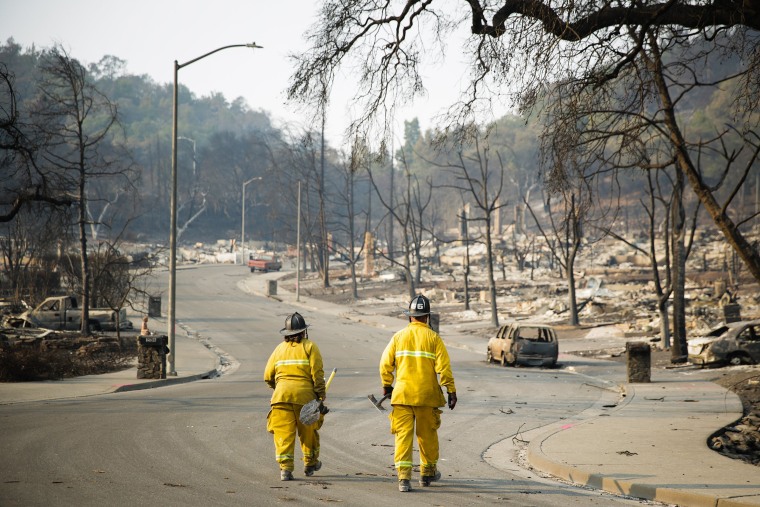After the fire: Blazes pose hidden threat to the West's drinking water



Gerald and Serene Buhrz were among the lucky ones.
When they fled their home at 2:00 a.m. on Oct. 8, 2017, the flames of the massive Tubb Fire had already engulfed most of the Fountaingrove neighborhood on the north side of Santa Rosa, Calif. They returned to their devastated street eight hours later to find their two-story stucco home still standing. It was surrounded by the embers of burned houses but untouched by flames.
Not all fire damage , however, is visible to the eye.
When Serene Buhrz turned the water on for the first time several days later, the chemical smell from their kitchen tap was overpowering.
"It was so strong you felt like you couldn't light a match," said her husband Gerald.
He called the city water department immediately, and got the agency to send someone to test the water.
Santa Rosa Water found the problem was not confined to the Buhrz home. Throughout Fountaingrove, plastic water pipes had melted as houses burned, releasing a carcinogenic chemical called benzene into the neighborhood's water system.
For nearly a year after the fire, Fountaingrove residents were told not to drink water from the tap, even if it was boiled first. Though their home was spared, the Buhrzes chose to live in a hotel for the 11 months of the advisory.
"You couldn't drink it, couldn't take a bath in it. You really couldn't do anything with the water so we just stayed out," said Gerald. The couple eventually returned home but Serene Buhrz still relies on bottled water.
"She still doesn't trust the water yet," said Gerald.
As more people build homes in fire-prone areas, and as climate change and other factors increase the frequency of fires, there is a growing risk to life and property throughout the West — and a lesser known risk to the region's already endangered water supply. At least 65 percent of the public water supply in the Western U.S. comes from fire-prone areas.
Blazes like the Tubb Fire and 2018's massive Camp and Carr wildfires can expose the drinking water for millions of people to the risk of contamination by toxic chemicals and parasites. Experts are concerned the new scale of wildfires torching urban areas could cause damage to public water supply that isn't immediately apparent.
"Lots of structures, vehicles, and man-made materials were involved in the Camp and Carr fires and there isn't a lot of information on how the environment is affected when these materials burn," said Clint Snyder, assistant executive officer of California's Central Valley Water Board.
The concern is prompting more intensive water testing programs following wildfires and spurring utility companies to invest in wildfire mitigation projects across the West.
HOUSES IN THE WOODS
One-third of U.S. homes are now built in what's called wildland-urban interface (WUI) areas, areas near or on land prone to wildfire. It's the fastest-growing land use type in the continental U.S.
According to U.S. Forest Service data, in just 20 years, new WUI areas grew by more than 46 million acres, covering an area larger than Washington State.
When these homes become wildfire tinder, insulation, roofing and home furnishings release toxins as they go up in flames, creating new sources of water contamination.
In addition to releasing toxins into the water supply, fires kill healthy tree roots. Without the roots, contaminating sediment and ash are flushed by rain into the reservoirs, rivers and lakes that supply cities with drinkable water.
In 2017 the U.S. Geological Survey published a study that predicted wildfires could double the amount of sediment in a third of the largest western watersheds by 2050. In some areas, sediment could increase 1,000 percent, potentially carrying parasites and harmful metals and chemicals with it.
According to representatives at the California State Water Resources Control Board, bacteria and parasite contamination, rather than chemical contamination, are the main worries in the wake of the Camp Fire, which burned 153,000 acres and 19,000 structures north of Sacramento, killing at least 86 people.
In Paradise, the town most affected by the Camp Fire, 22 out of 24 water systems were tested for contamination and cleared at the time of writing this article, but until the remaining two can be confirmed as uncontaminated, a Boil Water Notice, first released on Nov. 9, will remain in effect.
 Firefighters walk through the Fountaingrove neighborhood on Oct. 13, 2017 in Santa Rosa, California. Elijah Nouvelage / Getty Images file
Firefighters walk through the Fountaingrove neighborhood on Oct. 13, 2017 in Santa Rosa, California. Elijah Nouvelage / Getty Images file "My number one issue by far is actually not chemicals but intestinal issues due to parasites," said Gina Solomon, a clinical professor of medicine at the University of California San Francisco.
Solomon's biggest concern is a parasite called cryptosporidium. When bare soil is exposed because vegetation has burned, the sediment that is flushed into water sources often contains spores of the intestinal infection-causing parasite. While a discomfort to healthy people, cryptosporidium can become life-threatening to people who are undergoing chemotherapy, have AIDS, or are elderly.
"Cryptosporidium form spores and that's a problem because spores are like armored tanks, encasing the pathogen in a way that allows it to invade even significant amounts of chlorine," said Solomon.
The increased sediment also creates a costly problem for water treatment plants.
Read more at the seeded content




I am not sure how California is going to recover from this mess. I do know that having crypto poisoning is no joke, as my husband had it many years ago and it almost ended with him going to the hospital.
A line from a song comes to mind....
California tumbles into the sea
That'll be the day I go back to Annandale..
Can you name the song?
Steely Dan, My Old School.
I love Donald Fagan and his music for misanthropes.
I do, too! That is one of my all time faves. You should google the song to see the history of that story.
So basically, unnatural things burning causes unnatural problems....
Well, it's very natural for trees to burn, when they are dried out. I think they need to do something about the burnt out grass that causes the fires. That would be a good part of fire management.
Yeah - going back to the days before the 1600's, the woodlands, grasslands, forestry areas were kept clean, for the most part, by the Native Americans using burn control. They left pathways for game to travel, people to travel and plenty of clear areas for safety and productivity. One of the early "visitors" to this country stated that he had never seen such a pristine, well controlled environment, and this was in 1621.
IIRC, what is now in place to allow the natural overgrowth of the brush to continue on it's own, so as to promote natural burns, was a conscience decision by all the "smart people".
I guess we see that theory works. Albeit, too well.
I read several articles about this some time ago. If it was an engine I might be able to give a date, time and place. Sorry, not for this, but I think these discussions were going on in the 90s and early aughts.
Water, the most abundant planetary resource needs care if we are to survive.
Major challenge for the 21st century and beyond.
Very true Enoch. Water will be the commodity of the future.
It already is a commodity and has been for quite some time , people just haven't realized it because they are not looking at it in that way. even though most of the planet is covered in water only a small percentage of it is usable for human consumption , ie being potable . now some can be used that is unusable for people to drink , for agriculture , a good majority of it can not be.
if you live in an urban area or even a sub urban area and pay a water bill , you are paying not only for the upkeep of the system , but for the commodity of water .
fire has a natural cleansing and sterilization effect , but there are some things that can survive fires as the article points out. and another issue I noticed from the article was it said the piping melted ,releasing chemicals . well in the name of cost effectiveness , plastic is cheaper than metal pipes, the down side of plastics , they are made of chemicals that do have toxins in them waiting to be released under the right circumstances.
Even now my culinary water well on my property is worth some money , and the water rights I have for irrigation are worth even more. it is a commodity , because it is worth something to someone.
Our rivers, lakes and streams are the blood of mother earth. The water protectors are necessary.
So true!
I totally agree. We are going to have to make some hard decisions on how we "spend" our water.
Another example that we are overpopulated
While I agree, I think this issue is partly where people want to live. If you live near a fire zone, there is a good chance your house will burn down. This was an accident waiting to happen and really it is shocking that it took this long to happen.
Perrie - on the opposite side - when I was active duty with the Coast Guard on the East Coast, each and every hurricane caused devastating damage to the lands and to the homes. North Carolina, in '90, proposed a law that if a person/family bought land on the shore with the intention of living in that home, their insurance for their property would not be approved. Reason? Simple. Clear and present danger of putting themselves and others intentionally in harms way.
Should do the same for folks and their "luv" of living in a wooded area.
Yeah, they did the same thing for the flood plains people after the last 500 year Mississippi flood.... Mother nature has a habit of reminding people who's boss...... (sometimes it takes more than once for people to get the message)